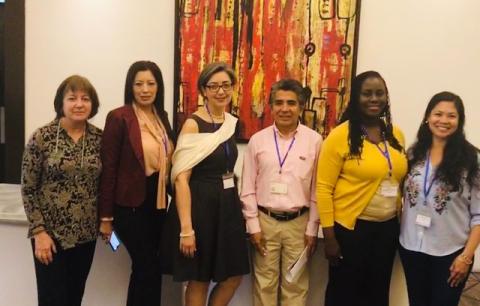IPEN Participating Organizations voice concerns about lead in paint in Latin America and the Caribbean

Left-to-right: Zuleica Nycz (Toxisphera, Brazil), Laura Emilce Florez (Altervida, Paraguay), Sofia Chavez (Casa Cem, Mexico), Placido Silva (Colnado, Colombia), Sherika Whitelocke-Ballingsingh (CARPIN, Jamaica) and Tiffany Tool (IPEN).
Panama City, Panama – Lead in paint was included in the Strategic Approach to International Chemicals Management (SAICM) framework as an emerging policy issue at its 2nd International Conference on Chemicals Management in 2009. Thereafter, the Global Alliance to Eliminate Lead Paint was formed. IPEN plays an important role in the Alliance and is an executing partner in a SAICM project on eliminating lead paint.
The Latin America and the Caribbean regional workshop on generating support for phasing out lead took place on 12 & 13 June 2019, in Panama City, Panama. Five IPEN Participating Organizations (POs) from five different countries participated in the workshop. Other stakeholders present included representatives from across Latin America and Caribbean governments, the UN Environment, World Health Organization, the American Bar Association Rule of Law Initiative, technical experts from the US Environmental Protection Agency, the International Paint and Printing Ink Council, and National Cleaner Production Centers.
Several topics were discussed at the workshop, such as results of lead paint studies conducted by IPEN Participating Organizations and others. A presentation on lead paint studies in Mexico was given by Sofia Chavez of Casa Cem, and a lead paint study in Jamaica by Sherika Whitelocke-Ballingsingh of CARPIN. Results from paint that was analyzed for lead content were concerning. It was stressed that in the case of Jamaica, where not as many samples tested positive for lead, even just one sample of paint that contains lead proves harmful to adults and children. Sherika Whitelocke-Ballingsingh pointed out that, “currently, there is no mechanism to stop companies from coming into Jamaica and using lead in their paints. This needs to be prevented.”
IPEN POs also highlighted the awareness-raising activities that they have conducted with communities on the ground. Presentations were provided on the Role of Civil Society in both Brazil (by Zuleica Nycz of Toxisphera) and Paraguay (by Laura Emilce Florez of Altervida).
Additionally, POs and paint industry participants spoke about alternatives to lead paint. A presentation on approaches for small and medium enterprises was given by Placido Silva from the organization Colnado in Colombia.
Key outcomes from the meeting included an agreement by everyone that lead paint elimination is important, and the need for laws/standards. The workshop was a good first step in what needs to be a joint effort from all stakeholders to adopt paint laws, support manufacturers in identifying alternatives to lead additives, and raise the awareness of the public about the vital need to phase-out lead in paint.
